Expat magazines come and go, but while they last they're pretty interesting.
Consider Compass, which started life as a folded piece of paper and now publishes three monthly entertainment guides. Or 24seven, which until a management change last year did not shirk from publishing nudity, profanity and articles with headlines like I'm Addicted to Hookers.
One of the latest and more eclectic of the genre is Xpat Magazine, which bills itself as "a low-cost entertaining magazine for those of us who are hungry for fresh writing and unique perspectives in this literature-starved nation." The English-only magazine is the brainchild of Matt Gibson, a 27-year-old Canadian who teaches English in Tainan.
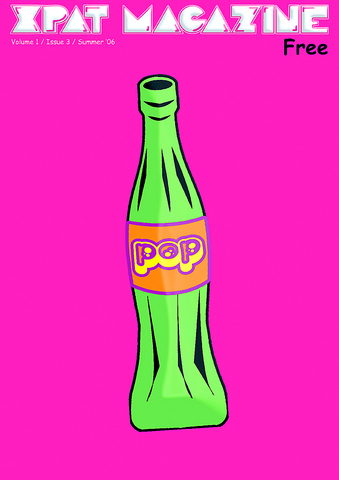
"I figured there were enough artists and dropout writers floating around the island," Gibson said in a phone interview last Thursday. "Most of the people who come to Taiwan (to teach English) have liberal arts degrees."
Among the stories in Xpat's summer issue are a primer on graffiti in Taiwan, a survey of Internet porn and a photo essay on the Yenshui fireworks festival (鹽水蜂炮). Highlights from previous issues include a photojournalist's account of a week spent with street kids in Kathmandu and a photo essay on spirit mediums in southern Taiwan.
Each 50-page issue focuses on a specific theme and is published in full color, with lavish layout spreads that are intended to be works of art in and of themselves. Xpat also publishes fiction and informational stories on topics such as "How You Should Have Prepared for Chinese New Year." Those interested in submitting stories to Xpat can contact Gibson at xpatmag@gmail.com. Back issues and additional content are available on the Web at www.xpatmag.com.
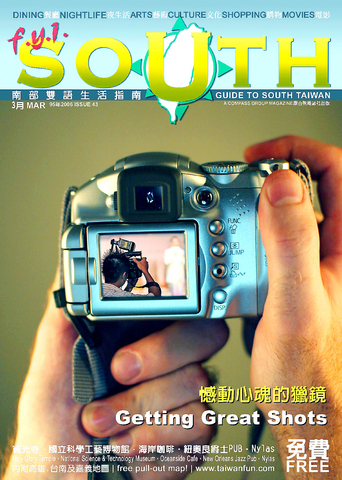
ALL PHOTOS COURTESY OF PUBLISHERS
"We try to get a broad audience of expats, from the just-arrived to the old-timers," said Gibson, who spends about 40 hours a week working on his magazine. "I try to keep it entertaining with some of the lowbrow humor, but we also publish more intellectual stuff."
Xpat launched in December with 4,000 copies distributed at foreigner hangouts in Taichung, Tainan, Chiayi and Kaohsiung. The next issue will be published in the first week of September.
Feedback has been, for the most part, "very good," Gibson said. Criticism has focused on some writers' negative comments about Taiwan. "There has been a tendency for people to vent about Taiwan in the magazine," Gibson said, but he added that he couldn't be picky about content when he doesn't pay his writers.
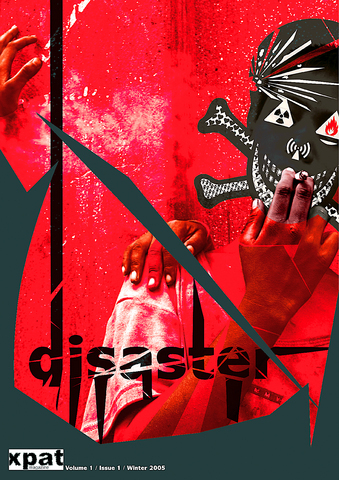
Like Xpat, most magazines run by foreigners are theme-based and do not pay for content. For writers living on the east coast, there's Hualien-based bilingual monthly Highway 11, which founder Ryan St. Onge said is "a travel magazine geared towards tourists but with content interesting enough that people living here would also find it informative." Copies of the 24-page magazine, which publishes 4,000 copies a month, can be found at train stations, restaurants and hotels from Taidung to Taipei. For submissions, send an e-mail to stongerp@yahoo.ca.
"There's very little in Chinese and less than nothing in English in the way of reading material on the east coast," St. Onge said. "There needed to be some sort of voice for it."
24seven started in Taichung and targets a younger, English-speaking demographic with themes like "Get With the Program" and "Propaganda." It now publishes 5,000 copies a month and is based in Taipei, where it has partnered with entertainment portal www.taiwannights.com. For submissions, send an e-mail to submit@24seventaiwan.com.
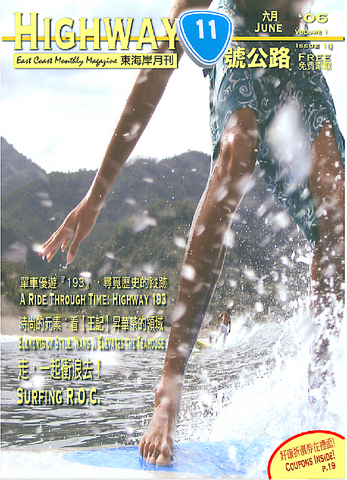
"We're set on making it a viable business opportunity," publisher Reese Richards said.
Taichung Voice, which celebrated its second anniversary last week, is topics-oriented and publishes 2,000 bilingual issues each month. Next month's theme will be animals. For submissions, send an e-mail to editor@thetaichungvoice.com.
"What we're ultimately trying to do is help the expats learn about the Taiwanese and Taiwanese culture, and shed some light on the expat culture to the Taiwanese," said publisher Lance Carroll.
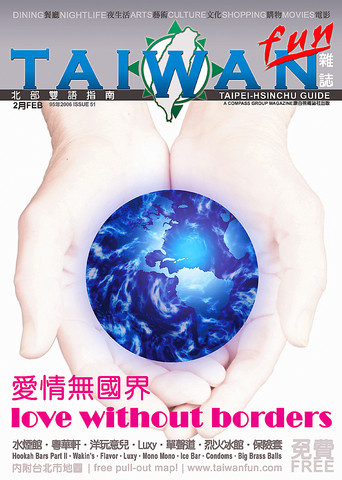
Taiwan's English-language literary journal, Pressed, which also operates out of Taichung, is still accepting stories for its September issue. Pressed publishes 3,500 copies twice a year and relies on donations, not advertisements. For submissions, e-mail pressed@asia.com.
"The freedom that people have here is overwhelming, but the people who actually take advantage of it are few and far between," said publisher Joel McCaffrey. "We're trying to network those people."
Will these magazines become lasting insti-tutions? Publishers said they either plan on sticking it out or making their magazines viable after they've left, but similar operations have come and gone. Taipei-based That (
"This business has a very high turnover rate," said Courtney Donovan Smith, co-publisher of the Compass Group of Media Properties. "It's a very capital-intensive business with low margins, and it takes quite a while to build a good solid readership base."
Compass started in 1994 as a newsletter for Taichung's American Chamber of Commerce. The company separated in 1998 and now publishes monthly bilingual entertainment guides for the Taichung area (Compass), the south (FYI South) and Taipei (Taiwan Fun). Each issue has a print run of 30,000 to 50,000 copies and most readers are Taiwanese. The Web site, www.taiwanfun.com, generated around 1.5 million to 2 million page views last month.
Smith said that an expat magazine can survive indefinitely as long as it maintains a small print run, does not pay for content and if its publishers are willing to occasionally lose money. "When you keep your scale small, it's not such a big deal. But once you get to a certain stage then you need to worry about all the taxes and legal issues." Publishing in Chinese attracts the attention of the authorities, and Compass publishers think twice about publishing stories that mention alcohol, tobacco products or make anything that can be construed as a health claim.
It wasn't until 2000 that Compass grew large enough to enable the company to hire staff. They now employ a dozen, in addition to 30 to 50 freelance translators, writers and photographers.
How did they survive? "Probably because we're stupid. Basically we just stuck with it," Smith said.

A vaccine to fight dementia? It turns out there may already be one — shots that prevent painful shingles also appear to protect aging brains. A new study found shingles vaccination cut older adults’ risk of developing dementia over the next seven years by 20 percent. The research, published Wednesday in the journal Nature, is part of growing understanding about how many factors influence brain health as we age — and what we can do about it. “It’s a very robust finding,” said lead researcher Pascal Geldsetzer of Stanford University. And “women seem to benefit more,” important as they’re at higher risk of

March 31 to April 6 On May 13, 1950, National Taiwan University Hospital otolaryngologist Su You-peng (蘇友鵬) was summoned to the director’s office. He thought someone had complained about him practicing the violin at night, but when he entered the room, he knew something was terribly wrong. He saw several burly men who appeared to be government secret agents, and three other resident doctors: internist Hsu Chiang (許強), dermatologist Hu Pao-chen (胡寶珍) and ophthalmologist Hu Hsin-lin (胡鑫麟). They were handcuffed, herded onto two jeeps and taken to the Secrecy Bureau (保密局) for questioning. Su was still in his doctor’s robes at

Last week the Democratic Progressive Party (DPP) said that the budget cuts voted for by the China-aligned parties in the legislature, are intended to force the DPP to hike electricity rates. The public would then blame it for the rate hike. It’s fairly clear that the first part of that is correct. Slashing the budget of state-run Taiwan Power Co (Taipower, 台電) is a move intended to cause discontent with the DPP when electricity rates go up. Taipower’s debt, NT$422.9 billion (US$12.78 billion), is one of the numerous permanent crises created by the nation’s construction-industrial state and the developmentalist mentality it

Experts say that the devastating earthquake in Myanmar on Friday was likely the strongest to hit the country in decades, with disaster modeling suggesting thousands could be dead. Automatic assessments from the US Geological Survey (USGS) said the shallow 7.7-magnitude quake northwest of the central Myanmar city of Sagaing triggered a red alert for shaking-related fatalities and economic losses. “High casualties and extensive damage are probable and the disaster is likely widespread,” it said, locating the epicentre near the central Myanmar city of Mandalay, home to more than a million people. Myanmar’s ruling junta said on Saturday morning that the number killed had